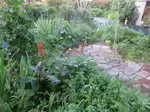Dear Reader, in this age of AI created content, please support with your goodwill someone who works harder to provide the human-made. Sign up at the top of the lefthand column or bottom of this page. You will receive my hand illustrated monthly newsletter RESTORE NATURE and access to the biodiversity garden design course as I write...and nothing else, I respect your time. I am also removing the advertizing as best I can as its become intrusive inappropriate and pays me nothing.
Lovingly maintained eco friendly Cape Town property
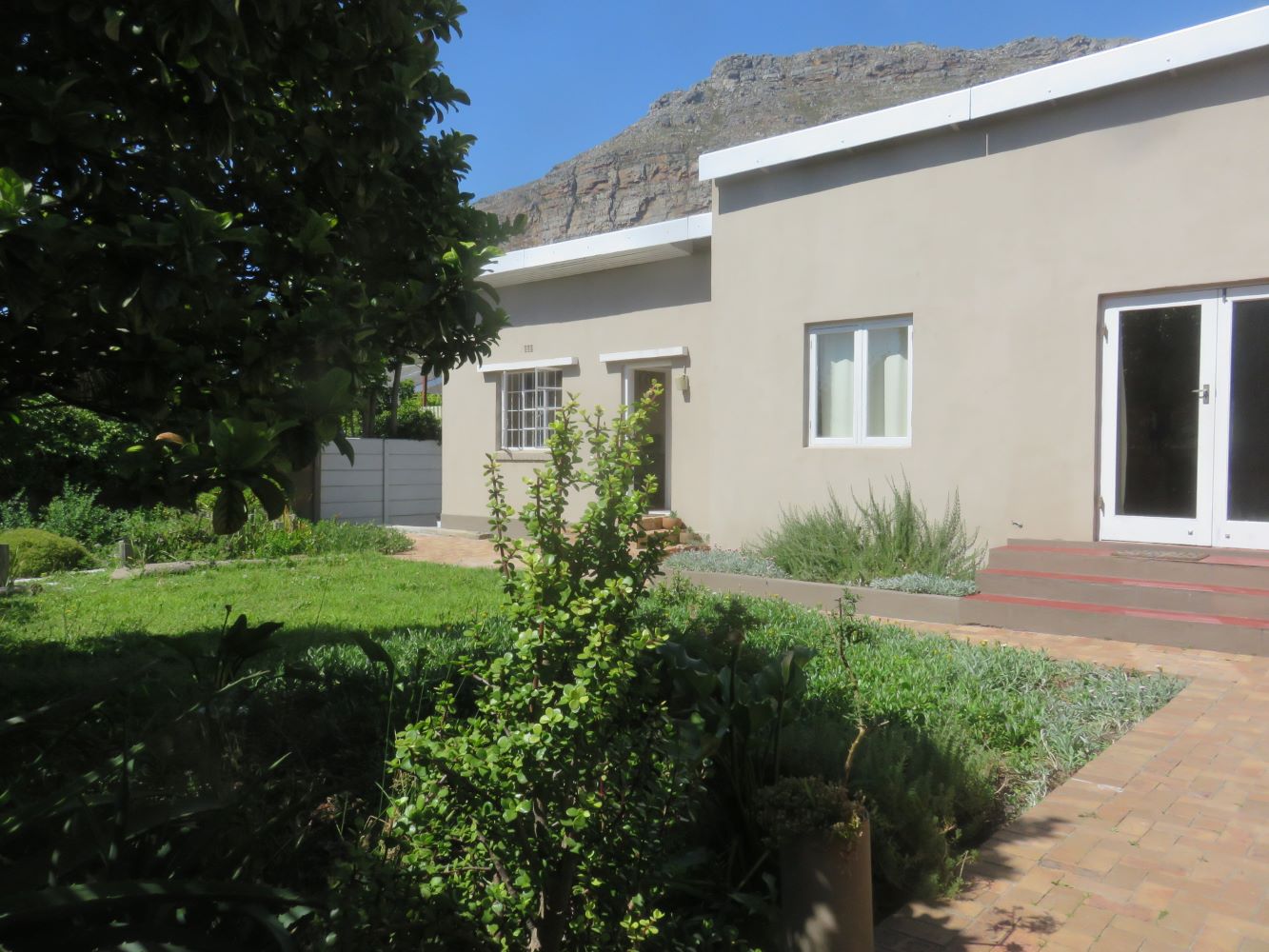 The back garden of our house on the lake at Zandvlei estuary, with Muizenberg mountain in the background.
The back garden of our house on the lake at Zandvlei estuary, with Muizenberg mountain in the background.The prices of Cape Town Property have shown a quarter century of inflation. At one stage the growth was so phenomenal that it became the best location in the world for investing in property. Who really knows how it happened. The desirability of this area must have first been stimulated by a low value currency and low cost of living, from the standpoint of many investors from northern countries, the moderate, amenable if erratic weather, the high number of sunshine days, the scenic backdrop of the mountains, the golden beaches and close proximity to many inland and coastal villages which offer fabulous opportunities for cultural and culinary touring, water sports, hiking and more, and the fresh promise of a brave new democracy. At the end of South Africa's isolation it was open to discovery by the world. It also changed us, our food, our stories, our businesses, our secluded nature spots, and the eco friendliness of our hotels and hospitality industry for the better.
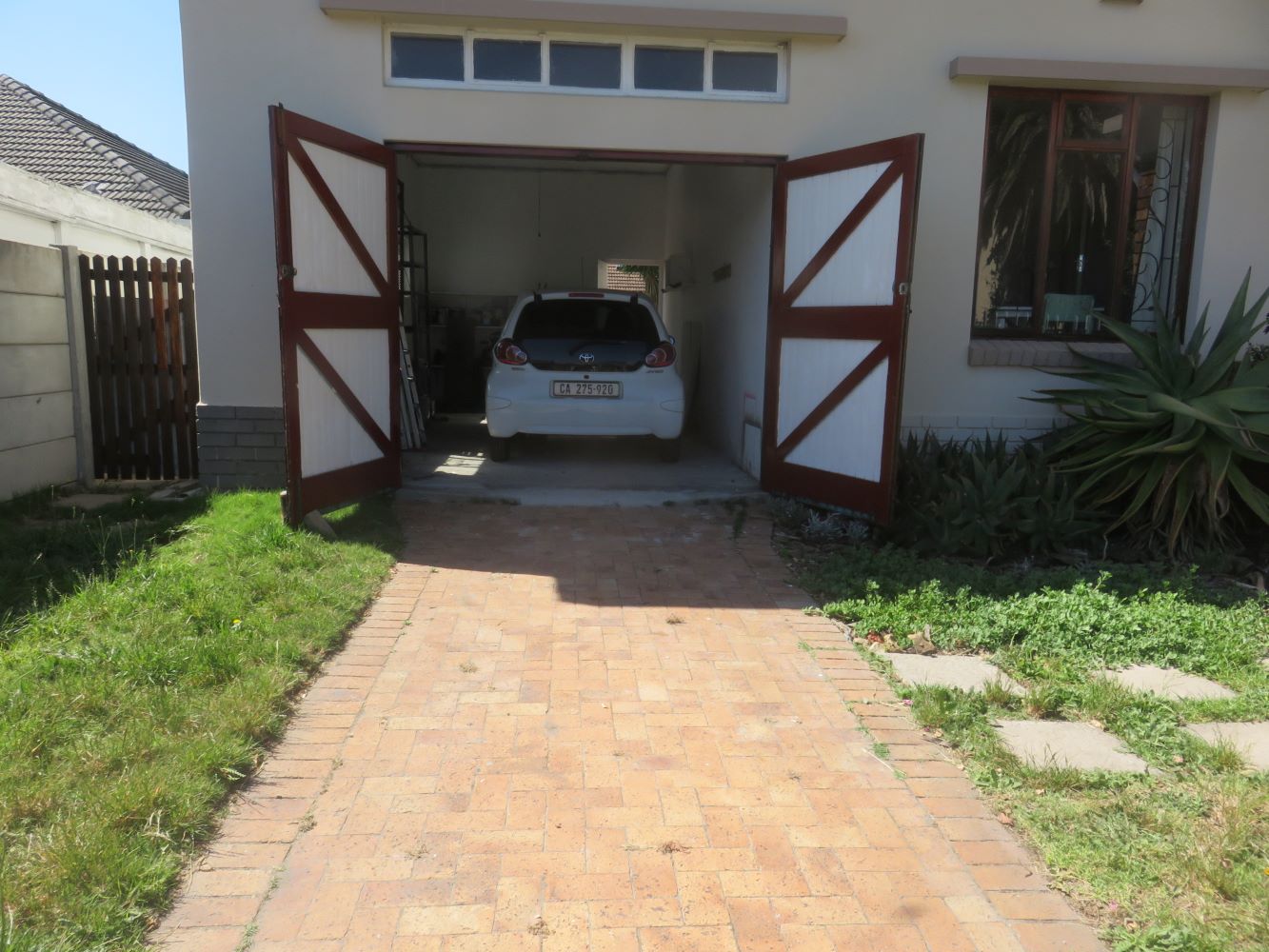 The house at Zandvlei has a massive garage in which two cars can fit end to end. The drive and front lawn can accommodate another two.
The house at Zandvlei has a massive garage in which two cars can fit end to end. The drive and front lawn can accommodate another two.We soon had a lot of foreign buyers in
our property market, and that stretched properties on the upper end
of the price spectrum ever heavenward, which brought other kinds of
investors.
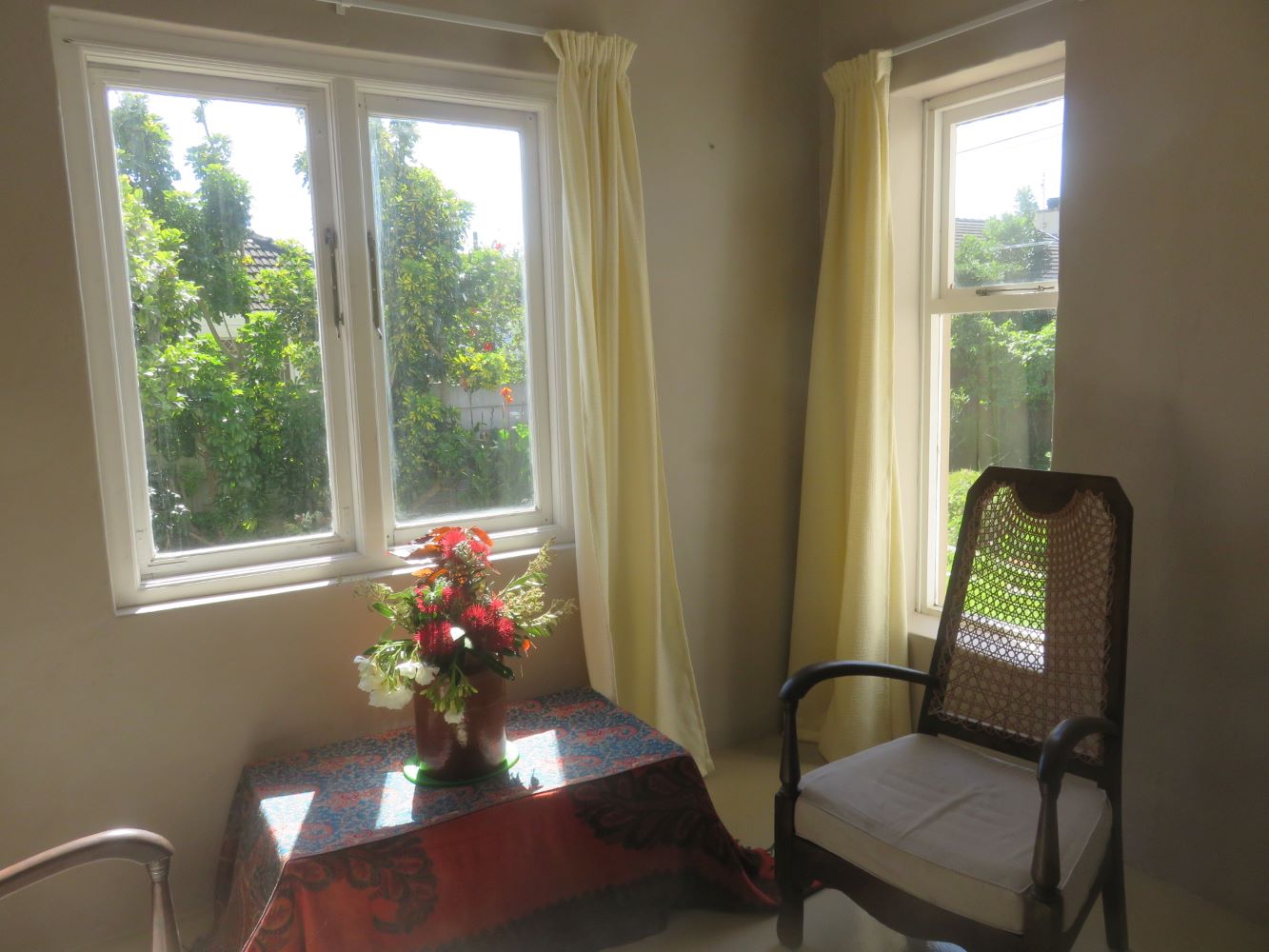 The granny flat lounge looks out on the back garden.
The granny flat lounge looks out on the back garden.The Cape's scenic beauty brings added value to some sectors of the property market, and that is most evident in property along the peninsula. Yet, for locals who are born here, impressions of scenic beauty are taken fore granted. We sit in traffic jams, or squeezed like sardines on our public transport, squinting into the hot sun and the blue silhouettes of mountains, or annoyed by mists that wreathe the lower slopes and river courses in mystery and make it necessary to slow down. The scenic parts of the city may shimmer in the smog at a great distance. We don't find time to get to the sea or the mountain as often as visitors. We don't see things that a visitor sees and we are sensitive to things they may miss.
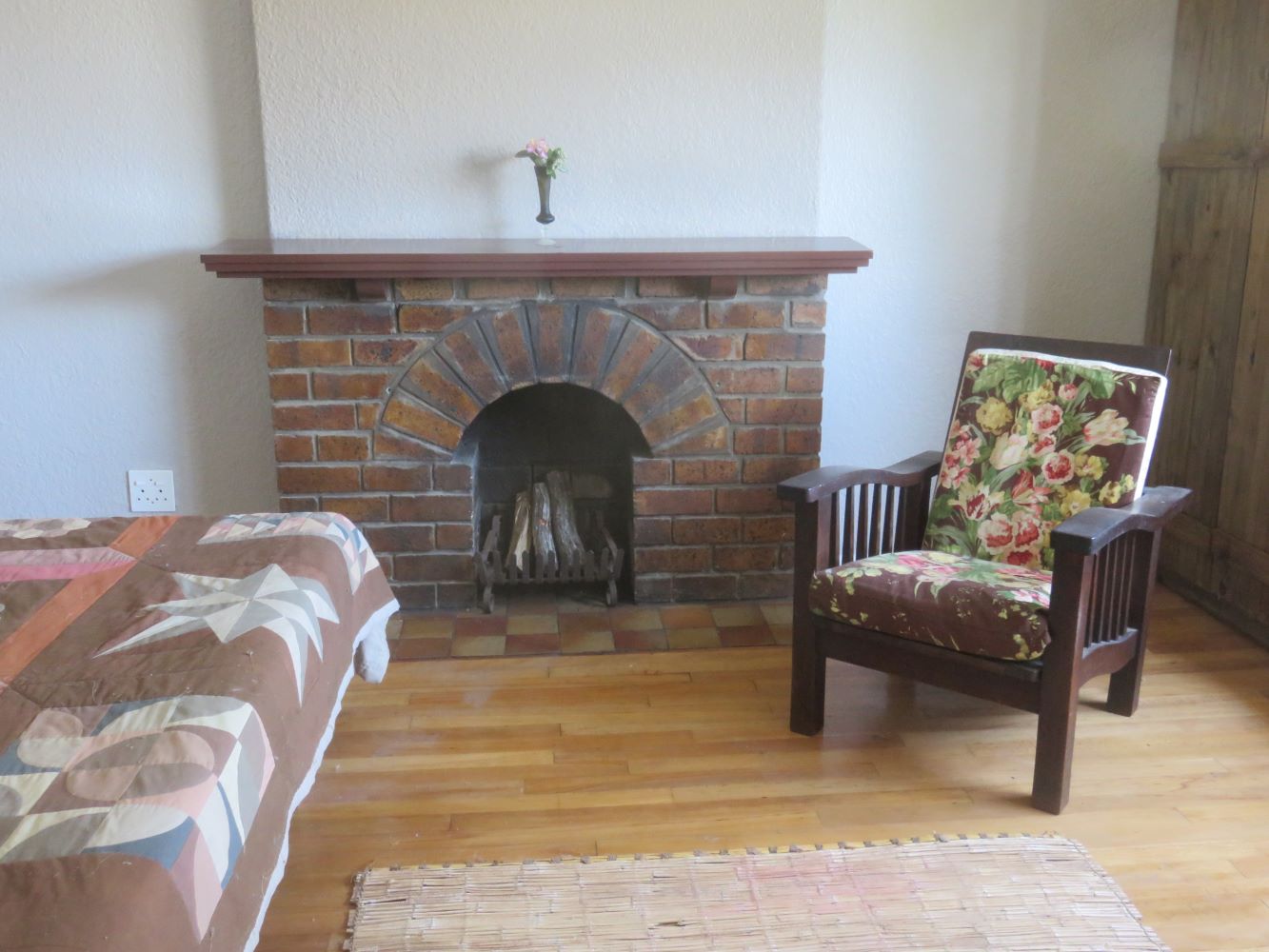 The front bedroom with its working fireplace could double as a third reception room.
The front bedroom with its working fireplace could double as a third reception room.It is the visitor's eye which shoots property prices skyward, so the dramatic beauty of coastal areas like the Atlantic seaboard caused a quarter century long boom, but eventually inflation invites deflation. When these prestige buyers start selling instead of buying there is deflation. This may occur when there is a loss of investor confidence. In just such circumstances, our first slow-down in upmarket property prices for decades has occurred. But, at the same time, prices in the townships and poorer areas continue to rise and properties exchange hands due to the high demand for housing. Tourists continue to visit our shores. Its not even a trend, they have been doing this for hundreds of years. It represents an incredible opportunity for some to buy property and a painful loss for others.
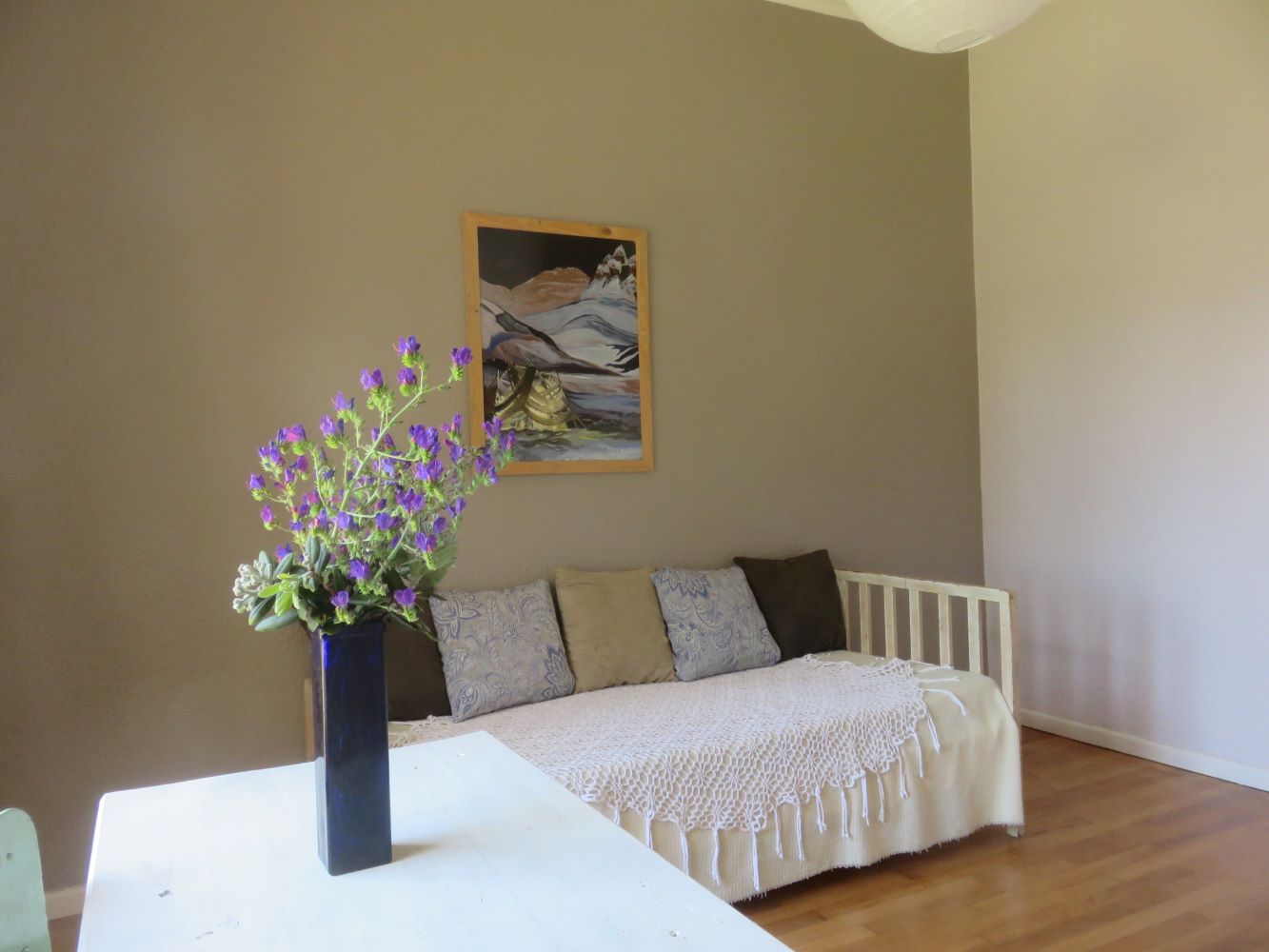 The second bedroom with my sister's painting. The second bedroom with my sister's painting. |
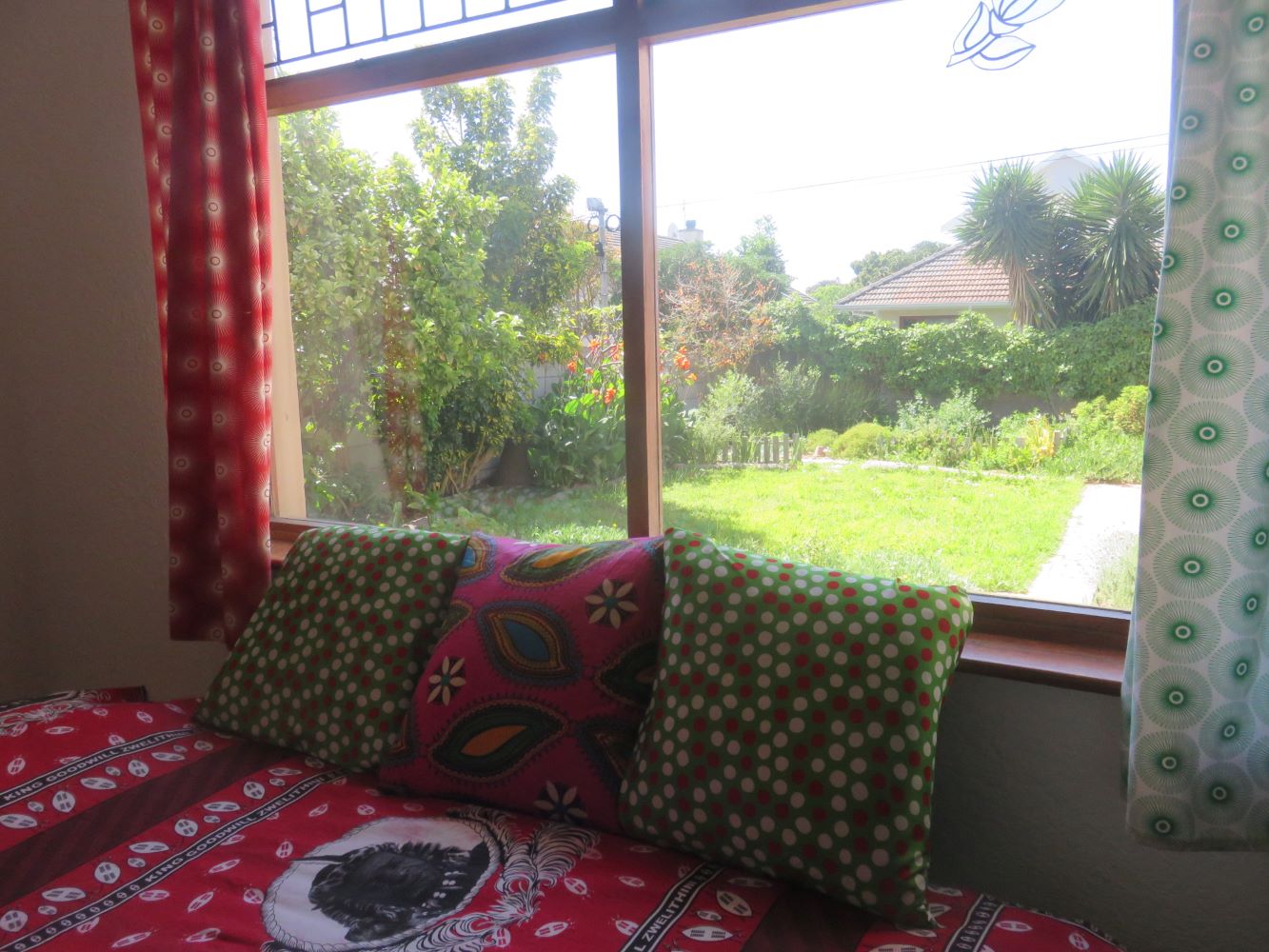 The third bedroom looks onto the back garden. The third bedroom looks onto the back garden. |
So the very expensive coastal
properties have taken a bit of a knock. On the other hand, you find
some areas, which have not been 'discovered' by foreign buyers, in
which you can enjoy sea or mountain at the same price it would take
to buy a home with no view or a hideous view without any of these
lovely environmental joys in close proximity. These places are more
stable, when it comes to property prices. They are enormous bargains
in the present buyer's market. Fabulous B & B material.
This lovingly maintained Cape Town property is up for sale
Our family home by the sea belonging to my sister, who is a painter
and illustrator, fits into this category. It is up for sale, for a very reasonable price, considering its proximity to the sea and mountains, and a private sale is possible. If you are interested, please drop me a message with your contact details in the space available at the bottom of the page, specifying that it is about the property at Zandvlei. I will be notified instantly and someone will contact you.
My sister, Lizza Littlewort, being an ex architecture student, fell in love with the 'modernist' straight lines and box like forms of the house. It also was situated a couple of houses away from her canoe club on the lake, Zandvlei, or 'sand lake'. It is part of a river estuary, a honeycombed system of lakes close to the beach at Muizenberg. This is the first village as you leave the flats and enter the peninsula that juts out into the southern ocean. You must pass through it if you are taking a trip down the False Bay coast to Cape Point. The old village is close, and full of trendy eateries and art studios. Many curious arts and crafts style Italianate houses from the early 20th Century contribute to the ambience of the place. Muizenberg mountain hangs overhead, plummeting steeply into the sea where the road rounds the bend to Kalk Bay fishing harbor.
I'm also an artist, though less well known than my sister, and I spent eight months restoring the house lovingly, after our last tenants vacated it. I took down some of the wild colors and harmonized the earth tones of the walls, painted the concrete floor with 4 layers of paint to give it a good finish, sanded and revarnished the stained wooden floors, restored the broken wooden gates at the front, and many other small repair jobs, all using skills I learned assisting my dad, who had no sons. My mother had large areas of the concrete perimeter fence rebuilt as they had been broken by trees.
I left the bathroom and kitchen alone. Both my sister and I love architectural integrity so much that we ignore the usual estate agent's recommendations to change light, bathroom and kitchen fittings regularly. I have an added reason, the terribly high carbon footprint of the building industry. All fired and heated materials, glass, metal, cement, tiles, plastics and so on, burn fossil fuels. Granite tops use materials made millions of years ago that are a non renewable resource. My restoration of this beautiful house was done only with paint (choosing low off-gassing types from the Fired Earth range) and repair tools.
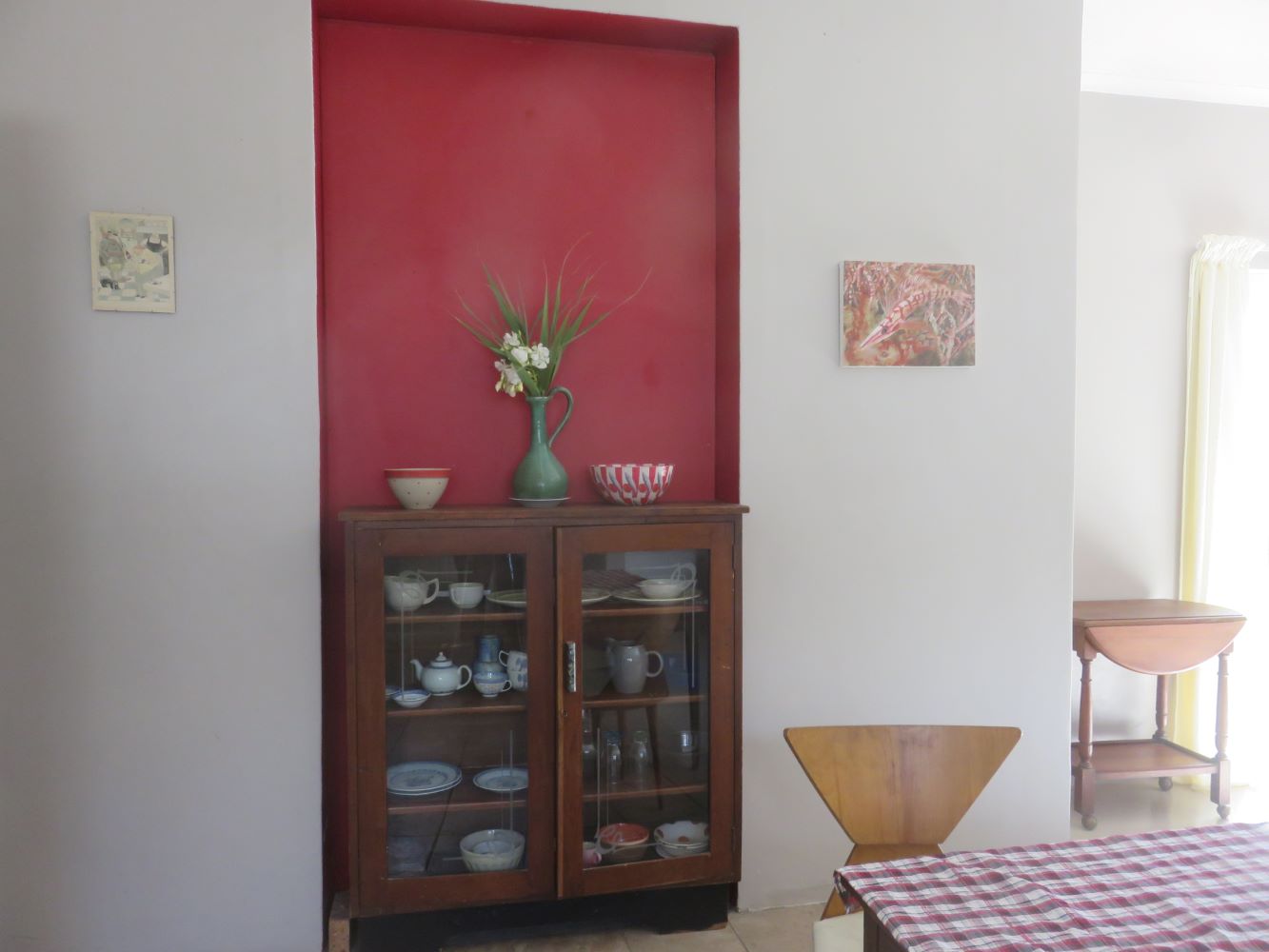
I relaid the vegetable garden at Zandvlei with a swathe of perennial food plants from my own nursery, so that it has six berry plants, including the interesting Gemsbok cucumber or jelly melon, and delicious cherry tomatoes. I brought in fifty plugs from Hart's organic nursery down the road in Ottery, chard, asparagus, herbs, kale and the like. They are coming along nicely.
As you can probably tell, I love growing things, both macroscopic and microscopic, and this urge seems to be unstoppable. The choice is only whether to obey, or be perpetually distracted by it from some other purpose. I inherited a green thread that can trace botanical activism through three generations, and in the dusty past through farming and fermenting for another three hundred years. In the previous three hundred thousand years, the ancestors of all mankind living at the Cape may have left a common memory that stirs all humans profoundly to this day. You will get it if you muse over the perfume of buchu, the funky notes of our wild herbs, or the gorgeous colors of the stars in the grass in spring.
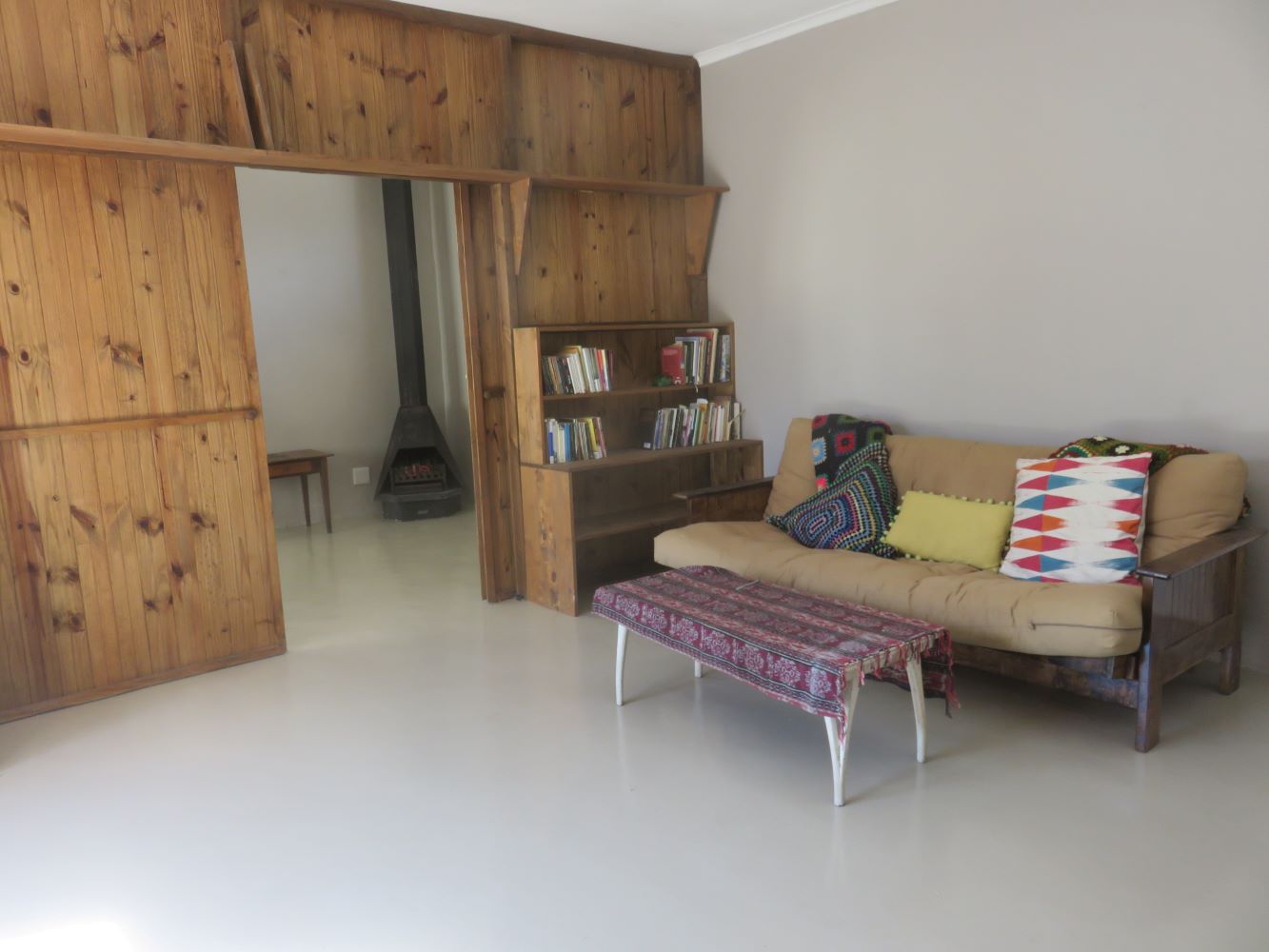 The main lounge at Zandvlei. A wooden screen can be drawn across to give the granny flat lounge, with its jet-master fireplace, privacy.
The main lounge at Zandvlei. A wooden screen can be drawn across to give the granny flat lounge, with its jet-master fireplace, privacy.As a consequence of these green interests I have a homestead in the making at my own home in another part of town called Goodwood. It will be rental accommodation. There is a herb 'forest' that blends into a fruit forest, two grey water wetlands (see my book on the building process in the right side bar), a giant humanure composter, three ponds and lots of dryland, marsh and water vegetables. All of this is on about a hundred square meters. I ferment of course, when I'm not fuming. I make wild berry vinegars, fermented mousses and krauts, using vegetables, fruit, sugar or salt for human consumption, and liquid manures, teas and beers, vermicompost and aerobic hot compost using waste organics for plant consumption, in both cases the fermentation is always wild.
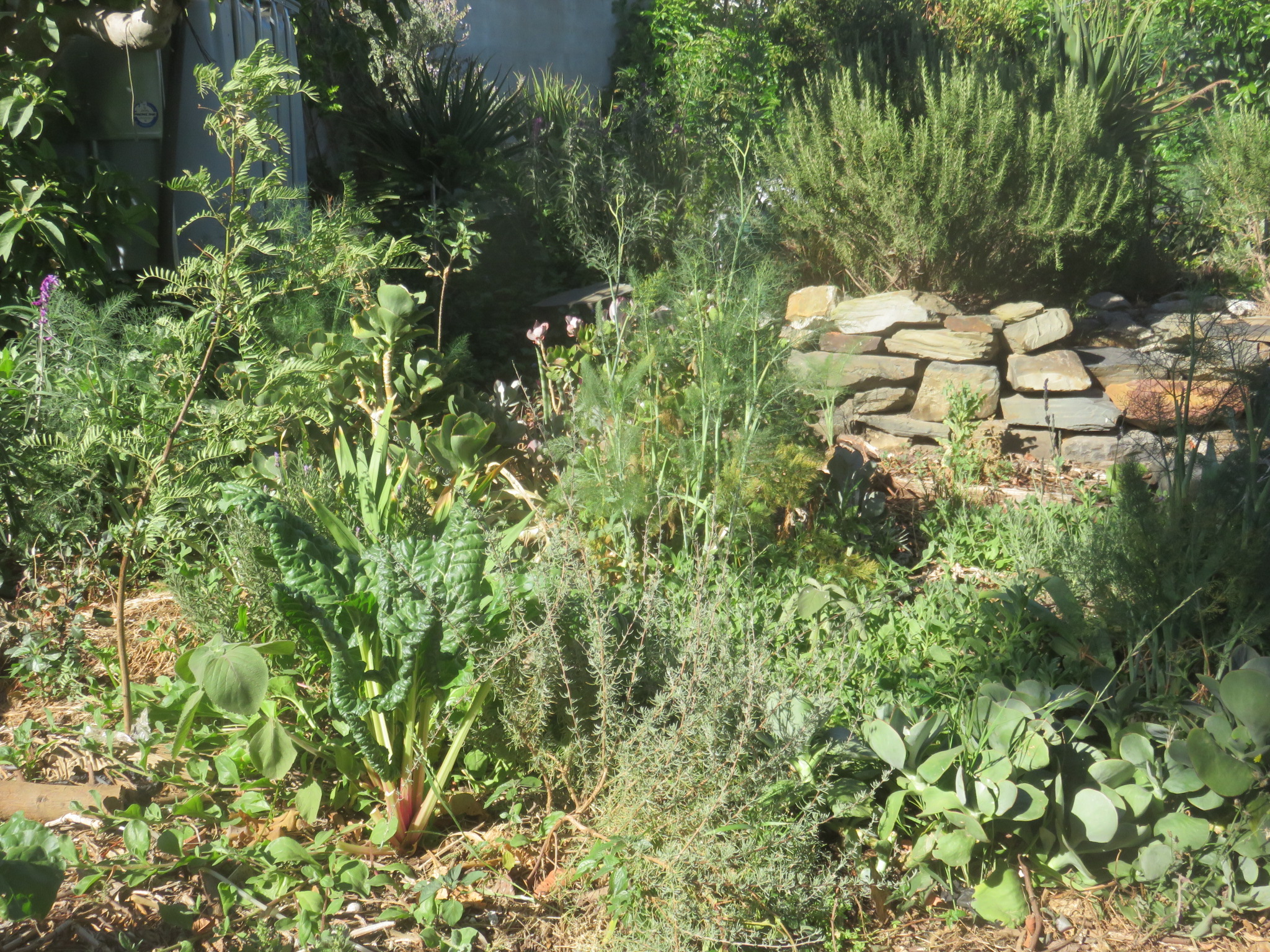 The herb garden in Goodwood.
The herb garden in Goodwood.We're hoping our accommodation businesses will fund completion of the footprint reduction needs of this rental home in Goodwood. We need solar power and water heating, a smokeless wood stove for artisanal pizza and other baking, and double the capacity of rain water storage. Then we'll be able to go completely off grid. We know visitors to this country care about staying in green accommodation, more than locals do for the time being, and we welcome them with open arms to share our living ecosystem with us in urban Cape Town.
Finishing up the homestead for hire has been a multi year project in which we've done almost all the hand work ourselves or with the help of friends with building experience.
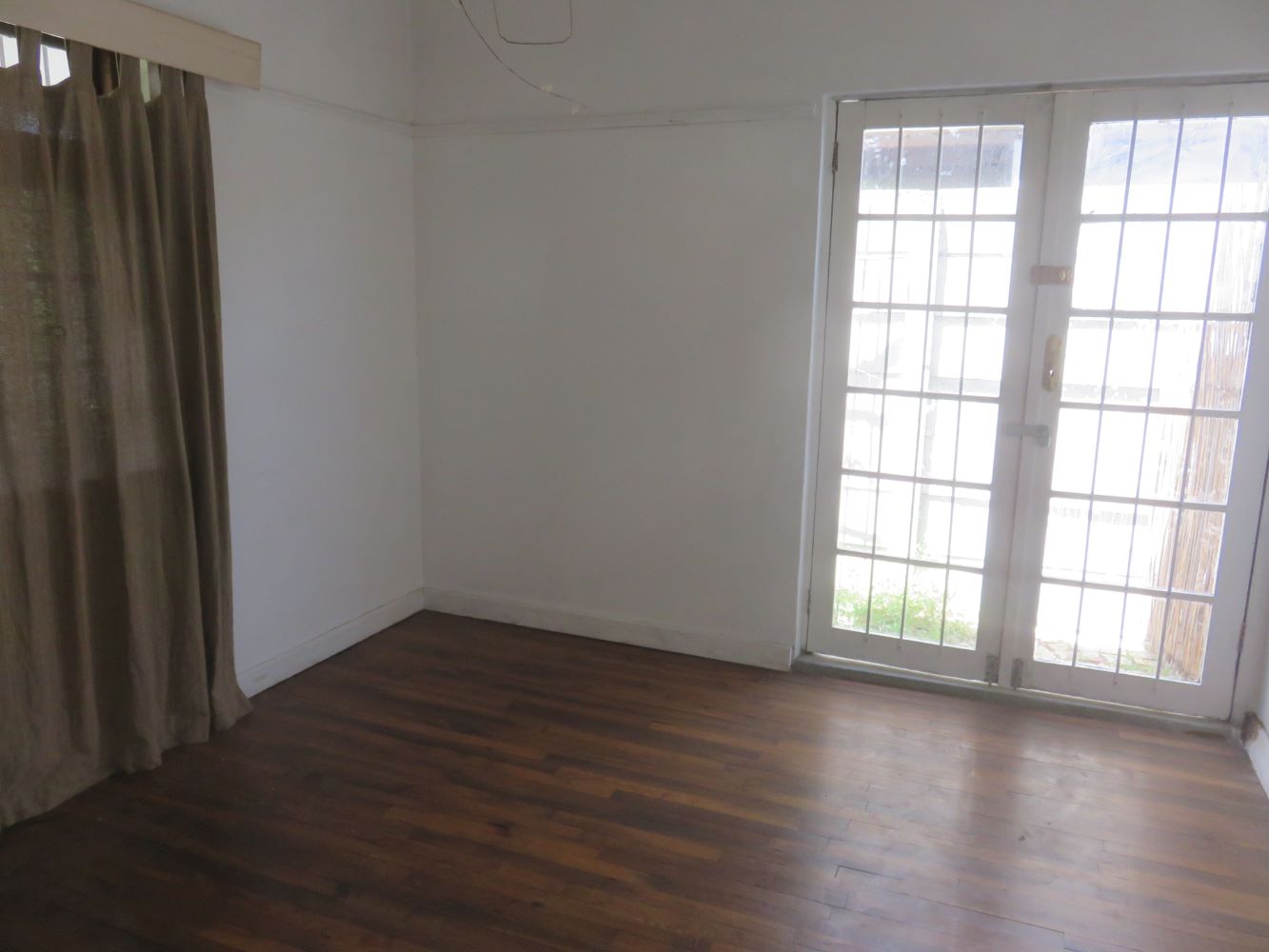 The cool, light filled front room of the urban homestead B&B in Goodwood, still unfurnished, but soon to be completed.
The cool, light filled front room of the urban homestead B&B in Goodwood, still unfurnished, but soon to be completed.We feel we must compost. The big global project which needs promoting and to which we feel we can at least contribute some knowledge, is the natural sequestration of carbon, not through some untested expensive process only technically dominant nations can afford, but through natural processes which have operated since the dawn of time, that can be applied in any country. We are a vermiculturist, aquaculturist, permaculturist, native plant gardener, forest and tree grower, wetland builder and composter in two people. We need to teach composting and soil building to a wider and wider audience, with all the other people who are doing it. I hope to become a trained soil advocate, and our other developing businesses all revolve around these issues. But advocacy itself does not feed us. It is time to leverage our bricks.
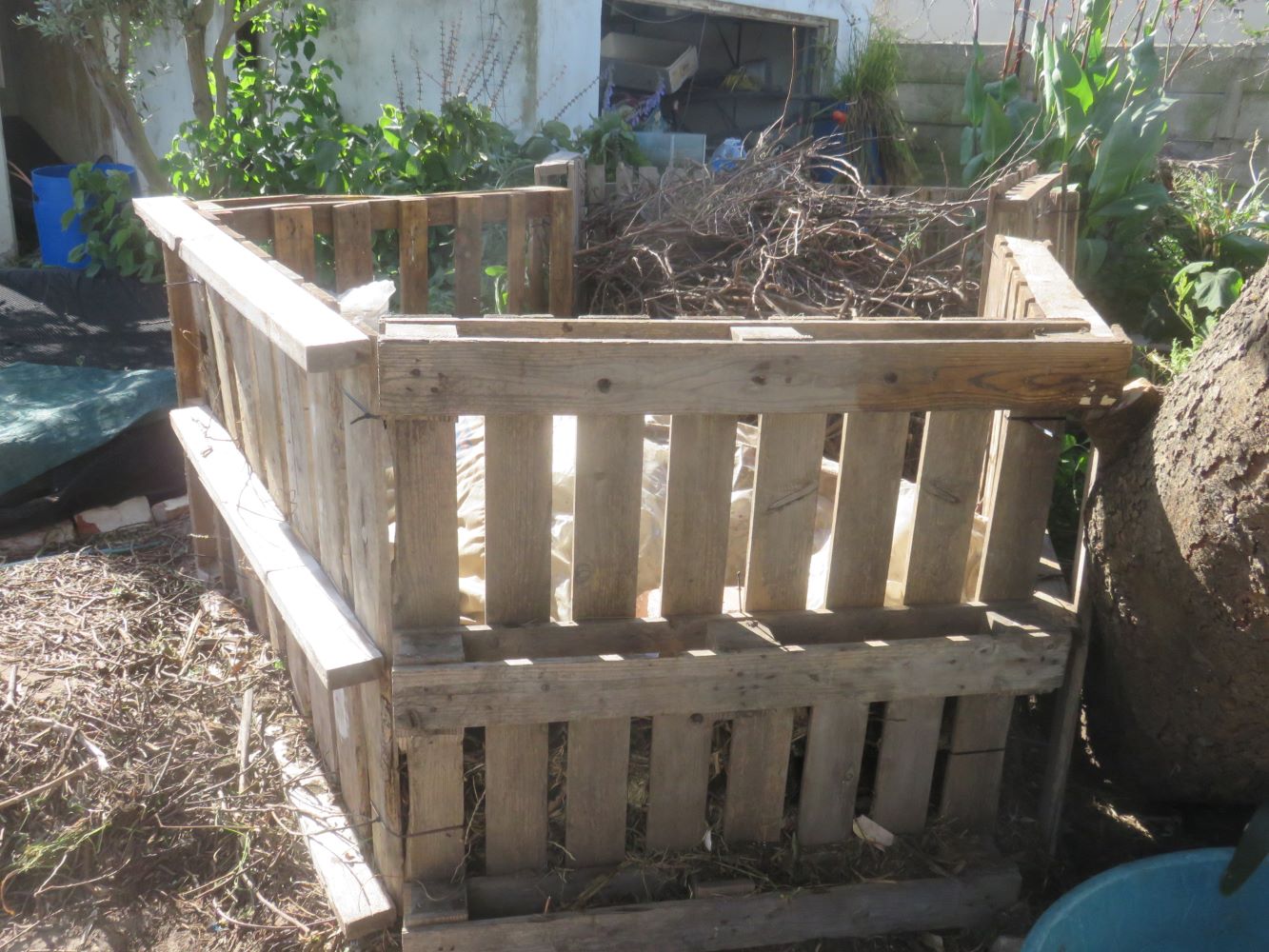 The big double pentagon composter in Goodwood.
The big double pentagon composter in Goodwood.Circumstances and histories point us towards offering eco friendly holiday accommodation. I hope you agree and will visit us and enjoy all the closed circles in our garden. Who knows, it may just be the start of something. The place is not on the sea, which is 8 kilometers away, but its near enough to the highways which take you up the west coast and out to the Stellenbosch and Durbanville wine-lands, without having to deal with the city traffic, because old Cape Town is 15 minutes away. Its a well planned, adequately serviced, working class area. Its super convenient, close to public transport (train, bus and taxi) shops, malls and other services, with an acceptable walk score. Though I use a bicycle to get around because its so flat.
Our house isn't made of rammed earth, there is a lot of concrete around which has been there for nearly eighty years. Its truly an urban space. But I'm an advocate of zero renovation, and not sending rubble to the dump, because of the carbon footprint of the building industry. The old well insulated brick house and its old fittings are appropriately eco friendly, just because they're old.
I hope you can feel the healthy ecological dynamics of our place, our massive sweet thorn sequestering carbon deep in these local soils, the pleasant humidity of
micro-climates created by dense foliage which stop the wind and
conserve water in the air. We save on everything and nothing is
wasted. This is a different kind of holiday accommodation. It is not
for everybody, much as I wish it were. But there is Wifi, and a plunge pool you can share with the Koi fish. The rental will be R550 per night short term, with a discount for longer stays. If you are coming to Cape Town and our place appeals to you, please leave a message at the bottom of the page in the available space, specifying it is about the Goodwood rental property. We will be notified immediately and get back to you within twenty four hours.
------
home page for links to articles on composting, vegetable growing, and more.
------
The eco products we produce: flora and fauna art prints, books, ferments and more.
Restore Nature Newsletter
I've been writing for four years now and I would love to hear from you
Please let me know if you have any questions, comments or stories to share on gardening, permaculture, regenerative agriculture, food forests, natural gardening, do nothing gardening, observations about pests and diseases, foraging, dealing with and using weeds constructively, composting and going offgrid.
SEARCH
Order the Kindle E-book for the SPECIAL PRICE of only
Prices valid till 30.09.2023
Recent Articles
-
garden for life is a blog about saving the earth one garden at a time
Apr 18, 25 01:18 PM
The garden for life blog has short articles on gardening for biodiversity with native plants and regenerating soil for climate amelioration and nutritious food -
Cape Flats Sand Fynbos, Cape Town's most endangered native vegetation!
Apr 18, 25 10:36 AM
Cape Flats Sand Fynbos, a vegetation type found in the super diverse Cape Fynbos region is threatened by Cape Town's urban development and invasive alien plants -
Geography Research Task
Jan 31, 25 11:37 PM
To whom it may concern My name is Tanyaradzwa Madziwa and I am a matric student at Springfield Convent School. As part of our geography syllabus for this
"How to start a profitable worm business on a shoestring budget
Order a printed copy from "Amazon" at the SPECIAL PRICE of only
or a digital version from the "Kindle" store at the SPECIAL PRICE of only
Prices valid till 30.09.2023

